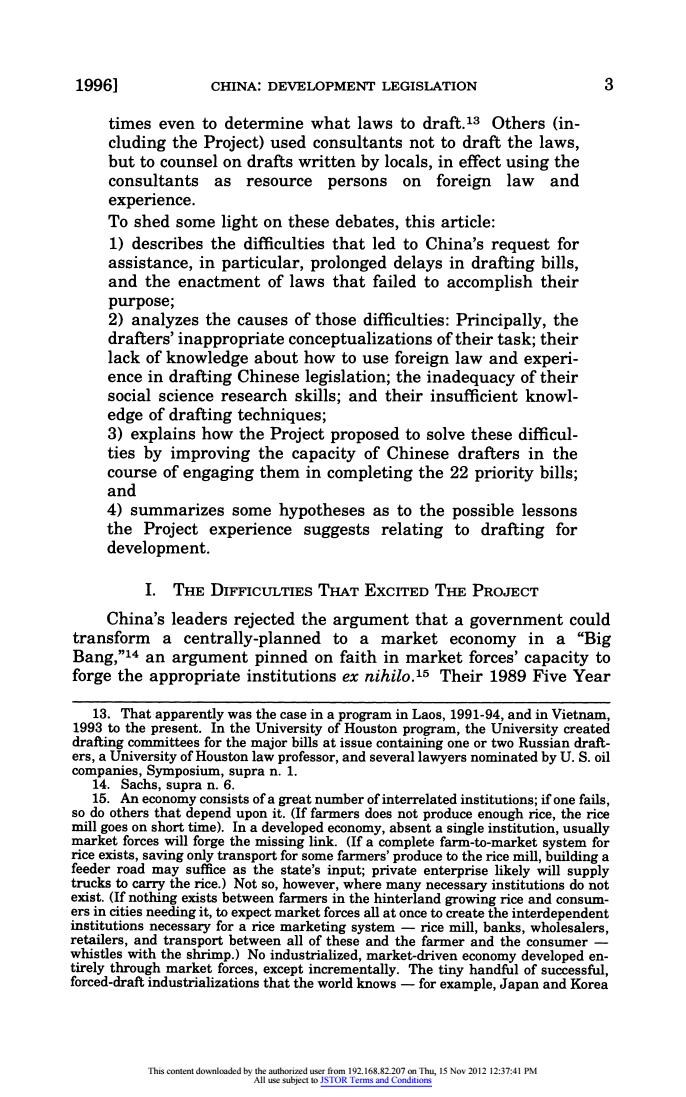正在加载图片...

1996] CHINA:DEVELOPMENT LEGISLATION 3 times even to determine what laws to draft.13 Others (in- cluding the Project)used consultants not to draft the laws, but to counsel on drafts written by locals,in effect using the consultants as resource persons on foreign law and experience. To shed some light on these debates,this article: 1)describes the difficulties that led to China's request for assistance,in particular,prolonged delays in drafting bills, and the enactment of laws that failed to accomplish their purpose; 2)analyzes the causes of those difficulties:Principally,the drafters'inappropriate conceptualizations of their task;their lack of knowledge about how to use foreign law and experi- ence in drafting Chinese legislation;the inadequacy of their social science research skills;and their insufficient knowl- edge of drafting techniques; 3)explains how the Project proposed to solve these difficul- ties by improving the capacity of Chinese drafters in the course of engaging them in completing the 22 priority bills; and 4)summarizes some hypotheses as to the possible lessons the Project experience suggests relating to drafting for development. I.THE DIFFICULTIES THAT EXCITED THE PROJECT China's leaders rejected the argument that a government could transform a centrally-planned to a market economy in a "Big Bang,"14 an argument pinned on faith in market forces'capacity to forge the appropriate institutions ex nihilo.15 Their 1989 Five Year 13.That apparently was the case in a program in Laos,1991-94,and in Vietnam. 1993 to the present.In the University of Houston program,the University created drafting committees for the major bills at issue containing one or two Russian draft- ers,a University of Houston law professor,and several lawyers nominated by U.S.oil companies,Symposium,supra n.1. 14. Sachs,supra n.6. 15.An economy consists of a great number of interrelated institutions;if one fails, so do others that depend upon it.(If farmers does not produce enough rice,the rice mill goes on short time).In a developed economy,absent a single institution,usually market forces will forge the missing link.(If a complete farm-to-market system for rice exists,saving only transport for some farmers'produce to the rice mill,building a feeder road may suffice as the state's input;private enterprise likely will supply trucks to carry the rice.)Not so,however,where many necessary institutions do not exist.(If nothing exists between farmers in the hinterland growing rice and consum- ers in cities needing it,to expect market forces all at once to create the interdependent institutions necessary for a rice marketing system-rice mill,banks,wholesalers retailers,and transport between all of these and the farmer and the consumer- whistles with the shrimp.)No industrialized,market-driven economy developed en- tirely through market forces,except incrementally.The tiny handful of successful forced-draft industrializations that the world knows-for example,Japan and Korea This content downloaded by the authorized user from 192.168.82 207 on Thu,15 Nov 2012 12:37:41 PM All use subject to JSTOR Terms and Conditions1996] CHINA: DEVELOPMENT LEGISLATION 3 times even to determine what laws to draft.13 Others (including the Project) used consultants not to draft the laws, but to counsel on drafts written by locals, in effect using the consultants as resource persons on foreign law and experience. To shed some light on these debates, this article: 1) describes the difficulties that led to China's request for assistance, in particular, prolonged delays in drafting bills, and the enactment of laws that failed to accomplish their purpose; 2) analyzes the causes of those difficulties: Principally, the drafters' inappropriate conceptualizations of their task; their lack of knowledge about how to use foreign law and experience in drafting Chinese legislation; the inadequacy of their social science research skills; and their insufficient knowledge of drafting techniques; 3) explains how the Project proposed to solve these difficulties by improving the capacity of Chinese drafters in the course of engaging them in completing the 22 priority bills; and 4) summarizes some hypotheses as to the possible lessons the Project experience suggests relating to drafting for development. I. THE DIFFICULTIES THAT EXCITED THE PROJECT China's leaders rejected the argument that a government could transform a centrally-planned to a market economy in a "Big Bang,"14 an argument pinned on faith in market forces' capacity to forge the appropriate institutions ex nihilo.15 Their 1989 Five Year 13. That apparently was the case in a program in Laos, 1991-94, and in Vietnam, 1993 to the present. In the University of Houston program, the University created drafting committees for the major bills at issue containing one or two Russian drafters, a University of Houston law professor, and several lawyers nominated by U. S. oil companies, Symposium, supra n. 1. 14. Sachs, supra n. 6. 15. An economy consists of a great number of interrelated institutions; if one fails, so do others that depend upon it. (If farmers does not produce enough rice, the rice mill goes on short time). In a developed economy, absent a single institution, usually market forces will forge the missing link. (If a complete farm-to-market system for rice exists, saving only transport for some farmers' produce to the rice mill, building a feeder road may suffice as the state's input; private enterprise likely will supply trucks to carry the rice.) Not so, however, where many necessary institutions do not exist. (If nothing exists between farmers in the hinterland growing rice and consumers in cities needing it, to expect market forces all at once to create the interdependent institutions necessary for a rice marketing system - rice mill, banks, wholesalers, retailers, and transport between all of these and the farmer and the consumerwhistles with the shrimp.) No industrialized, market-driven economy developed entirely through market forces, except incrementally. The tiny handful of successful, forced-draft industrializations that the world knows - for example, Japan and Korea This content downloaded by the authorized user from 192.168.82.207 on Thu, 15 Nov 2012 12:37:41 PM All use subject to JSTOR Terms and Conditions